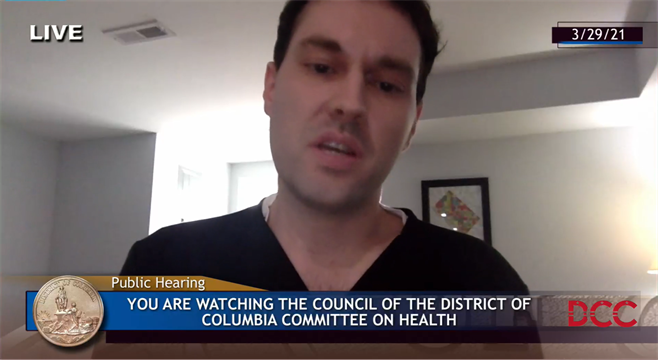Health Equity
Medicaid Enrollment Touches 39% of the Residents of The District of Columbia; DC’s 70/30 FMAP is Vital for the Maintenance of Health & Human Services
A reduction in the District’s FMAP would not lead to long-term government savings and would have a ripple effect throughout the entire health system in the DMV, crippling access to care for not only Medicaid beneficiaries but also all those who live, work, and visit the District of Columbia, including members of Congress and their staffs.
.png?sfvrsn=9ac2d21b_0)
Why does DC receive an Enhanced FMAP Rate?
The DC FMAP rate of 70% established by the Revitalization Act resulted from bipartisan analysis, discussion, and negotiation by Congressional leadership aiming to balance fairness with the District’s restricted ability to generate revenue. Congress recognized that the District of Columbia faces unique financial challenges due to its non-state status and the significant amount of federally-owned land within its boundaries. The District is unable to tax non-residents’ earnings, so these workers pay no taxes to support the infrastructure and services, such as roads, public safety and emergency services that they benefit from in the District. The District is also unable to tax up to 40% of the real property within its borders due to statutory restrictions.
Why are we concerned about DC's FMAP now?
Members of Congress have proposed reducing the DC FMAP to the statutory minimum for all other states, which is currently 50% (but could be reduced even more). Such a change would impact every physician and every practice, regardless of type, location, and payers contracted. Even practices who take no insurance will not be able to send patients for specialist care, hospital admissions, or other types of care.
What can MSDC members do?
- If you know a member of Congress or staffer, reach out to them and share how DC cuts will hurt your patients.
- Share your relationships and outreach with hay@msdc.org so we can help coordinate advocacy efforts.
- Email hay@msdc.org if you would like to be paired with a physician member of Congress office and trained by MSDC staff on how to reach out.
Resources
- DC FMAP cut fact sheet
- California Medical Association fact sheet on Medicaid cuts
- MSDC and healthcare association letter to Congress arguing against DC FMAP changes.
- MSDC original story on Medicaid changes.
News, Statements, and Testimony on Health Equity Issues
MSDC Advocacy Chair Testifies on Minor Consent Bill
On Monday, MSDC Advocacy Committee Chair Klint Peebles, MD, testified on behalf of the Medical Society of DC at a Committee on Health hearing. Dr. Peebles spoke to B24-0029, the Minor Consent to Healthcare for HIV and AIDS Clarification Amendment Act. In his testimony (seen in full below), he shared that the legislation tracks with American Medical Association policy and allows adolescents to consent to good healthcare practices without fear of retribution.
Chair Vincent Gray thanked Dr. Peebles for his testimony and the Medical Society's work on legislation last year allowing minors to consent to vaccinations without parental consent. Councilmember Pinto echoed that thanks and asked Dr. Peebles and Dr. Kathy Ferrer of Children's National questions on the science behind minor consent in medicine.

March 29, 2021
Councilmember Vincent Gray
Chair, Committee on Health
1350 Pennsylvania Ave NW
Washington, DC 20004
Dear Chairman Gray,
The Medical Society of the District of Columbia (MSDC) is the largest medical organization representing metropolitan Washington physicians in the District. We advocate on behalf of all 11,000 plus licensed physicians in the District and seek to make the District “the best place to practice medicine.”
I thank your committee for considering B24-0029, the Minor Consent to Healthcare for HIV and AIDS Clarification Amendment Act of 2021. The importance of this legislation cannot be overstated as it will enhance access to care for minors, reduce stigma surrounding HIV infection and prevention, and empower minors to make timely and responsible decisions for their own health. Many adolescents may be unwilling to receive sensitive healthcare services if they need to involve their parent or guardian, which can result in barriers for not only testing but also for treatment and prevention. Conversations concerning HIV prevention, diagnosis, and treatment often intersect with discussions about sexual behavior and identity, both of which minors may not feel comfortable disclosing to parents and family. We further appreciate the intent of this legislation to clarify existing statutes that a minor of any age may consent to such health services as long as their provider deems them capable of giving informed consent given that all patient encounters and circumstances are unique and must be assessed within their own context.
Such language is well-aligned with existing policy from the American Medical Association, including H60.965, which affirms that confidential care for adolescents is critical to improving their health, and H60.958, which specifically recommends that rights be conferred upon minors to consent for the means of prevention, diagnosis, and treatment of STDs, including HIVAIDS.
Thank you for working so intently to safeguard the health of the District’s residents, including its most vulnerable and marginalized residents. I am happy to answer any questions and work with all your offices to continue making the District the best place to practice medicine.
Sincerely,
Klint Peebles, MD FAAD
Chair, MSDC Advocacy Committee

Leave a comment